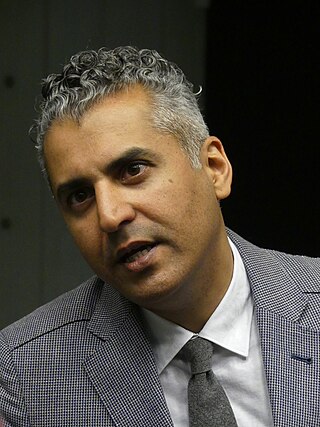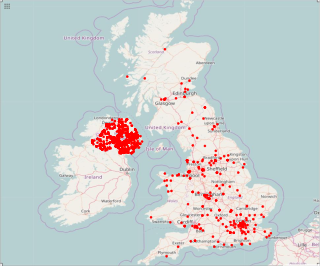Related Research Articles
Islamic terrorism refers to terrorist acts with religious motivations carried out by fundamentalist militant Islamists and Islamic extremists.

Al-Muhajiroun is a proscribed militant network based in Saudi Arabia. The founder of the group was Omar Bakri Muhammad, a Syrian who previously belonged to Hizb ut-Tahrir; he was not permitted to re-enter Britain after 2005. According to The Times, the organisation has been linked to international terrorism, homophobia, and antisemitism. The group became notorious for its September 2002 conference "The Magnificent 19", praising the September 11, 2001 attacks. The network mutates periodically so as to evade the law; it operates under many different aliases.

Anjem Choudary is a Pakistani-British Islamist and a social and political activist who has been described as "the face" of militant Islamism or the "best known" Islamic extremist in Britain.

Jihadism is a neologism for militant Islamic movements that are perceived as existentially threatening to the West. It has been applied to various insurgent Islamic extremist, militant Islamist, and terrorist individuals and organizations whose ideologies are based on the Islamic notion of jihad. It has also been applied to various Islamic empires in history, such as the Umayyad Caliphate and the Ottoman Empire, who extensively campaigned against non-Muslim nations in the name of jihad.

Islamic extremism, Islamist extremism or radical Islam refers a set of extremist beliefs, behaviors and ideology within Islam. These terms remain contentious, encompassing a spectrum of definitions, ranging from academic interpretations to the notion that all ideologies other than Islam have failed and are inferior. Furthermore, these terms may extend to encompass other sects of Islam that do not share such extremist views.
Radicalization is the process by which an individual or a group comes to adopt increasingly radical views in opposition to a political, social, or religious status quo. The ideas of society at large shape the outcomes of radicalization. Radicalization can result in both violent and nonviolent action – academic literature focuses on radicalization into violent extremism (RVE) or radicalisation leading to acts of terrorism. Multiple separate pathways can promote the process of radicalization, which can be independent but are usually mutually reinforcing.

Maajid Usman Nawaz is a British activist and former radio presenter. He was the founding chairman of the think tank Quilliam. Until January 2022, he was the host of an LBC radio show on Saturdays and Sundays. Born in Southend-on-Sea, Essex, to a British Pakistani family, Nawaz is a former member of the Islamist group Hizb ut-Tahrir. His membership led to his December 2001 arrest in Egypt, where he remained imprisoned until 2006. While there, he read books about human rights and made contact with Amnesty International who adopted him as a prisoner of conscience. He left Hizb-ut-Tahrir in 2007, renounced his Islamist past, and called for a secular Islam. Later, Nawaz co-founded Quilliam with former Islamists, including Ed Husain.
Quilliam was a British think tank co-founded in 2008 by Maajid Nawaz that focused on counter-extremism, specifically against Islamism, which it argued represents a desire to impose a given interpretation of Islam on society. Founded as The Quilliam Foundation and based in London, it claimed to lobby government and public institutions for more nuanced policies regarding Islam and on the need for greater democracy in the Muslim world whilst empowering "moderate Muslim" voices. The organisation opposed any Islamist ideology and championed freedom of expression. The critique of Islamist ideology by its founders―Nawaz, Rashad Zaman Ali and Ed Husain―was based, in part, on their personal experiences. Quilliam went into liquidation in 2021.

Terrorism in the United Kingdom, according to the Home Office, poses a significant threat to the state. There have been various causes of terrorism in the UK. Before the 2000s, most attacks were linked to the Northern Ireland conflict. In the late 20th century there were also attacks by Islamic terrorist groups. Since 1970, there have been at least 3,395 terrorist-related deaths in the UK, the highest in western Europe. The vast majority of the deaths were linked to the Northern Ireland conflict and happened in Northern Ireland. In mainland Great Britain, there were 430 terrorist-related deaths between 1971 and 2001. Of these, 125 deaths were linked to the Northern Ireland conflict, and 305 deaths were linked to other causes, including 270 in the Lockerbie bombing. Since 2001, there have been almost 100 terrorist-related deaths in Great Britain.

The Clarion Project is an American nonprofit organization based in Washington, D.C. that was founded in 2006. The organization has been involved in the production and distribution of the films Obsession: Radical Islam's War Against the West, The Third Jihad: Radical Islam's Vision For America, Iranium, and Honor Diaries. These films have been criticized by some for allegedly falsifying information and described as anti-Muslim propaganda. The organization publishes a weekly "Extremism Roundup" newsletter.

Salafi jihadism, also known as revolutionary Salafism or jihadist Salafism, is a religious-political Sunni Islamist ideology that seeks to establish a global caliphate, characterized by the advocacy of "physical" (military) jihadist attacks on non-Muslim and (takfired) Muslim targets. The Salafist interpretation of sacred Islamic texts is "in their most literal, traditional sense", which adherents claim will bring about the return to "true Islam".
Islamic extremism in the United States comprises all forms of Islamic extremism occurring within the United States. Islamic extremism is an adherence to fundamentalist interpretations of Islam, potentially including the promotion of violence to achieve political goals. In the aftermath of the September 11, 2001 terror attacks, Islamic extremism became a prioritized national security concern of the U.S. government and a focus of many subsidiary security and law enforcement entities. Initially, the focus of concern was on foreign Islamic terrorist organizations, particularly al-Qaeda, but in the course of the years since the September 11 terror attacks, the focus has shifted more towards Islamic extremist and jihadist networks within the United States.
Madkhalism is a strain of quietist thought within the larger Salafi movement based on the writings of Sheikh Rabee al-Madkhali, characterised by monarchism and loyalty to governments in the Arab world.
Moderate Islam and moderate Muslim are labels that are used within counterterrorism discourse as the complement of "Islamic extremism" and imply that supporting Islamic terrorism is the characteristic of a "radical" faction within Islam, and a "moderate" faction of Muslims denounces extremist violence such as Islamic terrorism, militant jihadism and radical Islamism.
Shiraz Maher is a British writer and analyst, and Director at the International Centre for the Study of Radicalisation and Political Violence (ICSR) at King's College London. He also teaches at Johns Hopkins University. The son of Pakistani immigrants, for several years after 9/11 Maher was a member of the Islamist organisation Hizb ut-Tahrir, but left the movement after the 2005 London bombings and became an outspoken critic of radical Islam. He has written for leading newspapers in Britain and elsewhere, produced reports and studies on counterterrorism strategy, and appeared in the international news media as a commentator on jihad and radicalisation.

Hizb ut-Tahrir Britain is the official name of the United Kingdom branch of Hizb ut-Tahrir, a transnational, pan-Islamist and fundamentalist group that seeks to re-establish "the Islamic Khilafah (Caliphate)" as an Islamic "superstate" where Muslim-majority countries are unified and ruled under Islamic Shariah law, and which eventually expands globally to include non-Muslim states such as Britain. The group was designated a proscribed terrorist organization in the UK in January 2024.
Ahmad Musa Jibril, also known as Abu Khaled, is a Palestinian-American Islamic radical preacher, cleric, sheikh, and imam. In 2004 he was convicted on 42 charges including fraud. Ideologically influenced by the Sahwa movement, which combines the Islamist revolutionary ideology of Sayyid Qutb mixed with Saudi Wahabbism, he promotes Salafist militant Islamism, and has extensively preached about the Syrian Civil War in highly emotive pro-Sunni terms. While not known to be affiliated directly to any particular group, it has been claimed that he has been an inspirational source for many English speaking pro-Sunni jihadist fighters in Syria, in both al-Nusra and Islamic State of Iraq and the Levant, and elsewhere.
Following the embargo by Arab oil exporters during the Israeli-Arab October 1973 War and the vast increase in petroleum export revenue that followed, the international propagation of Salafism and Wahhabism within Sunni Islam favored by the conservative oil-exporting Kingdom of Saudi Arabia and other Gulf monarchies achieved a "preeminent position of strength in the global expression of Islam." The Saudi interpretation of Islam not only includes Salafiyya but also Islamist/revivalist Islam, and a "hybrid" of the two interpretations.
This is a list of individual liberal and progressive Islamic movements in Europe, sorted by country. See also Islam in Europe and Euroislam.
Online youth radicalization is the action in which a young individual or a group of people come to adopt increasingly extreme political, social, or religious ideals and aspirations that reject, or undermine the status quo or undermine contemporary ideas and expressions of a state, which they may or may not reside in. Online youth radicalization can be both violent or non-violent.
References
- 1 2 3 4 5 6 7 8 9 10 11 Hornall, Thomas (8 October 2015). "What It's Like to Grow Up as a Closeted Gay Extremist Muslim". Vice . Vice Media. ISSN 1077-6788. OCLC 30856250. Archived from the original on 1 November 2020. Retrieved 19 December 2023.
- 1 2 3 4 5 6 Sommerlad, Nick (28 August 2015). "I was a hate preacher who radicalised at least one Brit jihadi but I've changed after coming out'". Daily Mirror . Retrieved 19 January 2024.
- 1 2 3 4 Vine, Jeremy; Ahmed, Sohail (2015). "the former Islamic extremist who says he became radicalised to suppress his homosexuality". BBC Radio 2 . Retrieved 19 January 2024.
- ↑ Counter extremism expert on terror threat of Islamism , retrieved 2021-10-19
- ↑ "How a Young Londoner Escaped Radical Islam". HuffPost. 2016-06-22. Retrieved 2021-10-16.
- 1 2 3 4 5 "A gay Muslim speaks: Why I left radical Islamism | Peter Tatchell Foundation". www.petertatchellfoundation.org. 11 November 2015. Retrieved 2021-10-10.
- 1 2 "Hostility & support at LGBT-Muslim Solidarity launch | Peter Tatchell Foundation". www.petertatchellfoundation.org. 22 October 2015. Retrieved 2021-10-10.
- ↑ "Reformed Islamic extremist looks back". MSNBC. Retrieved 2021-10-10.
- ↑ Gay Muslim: I radicalized to try 'to cure myself' - CNN Video, 20 June 2016, retrieved 2021-10-10
- ↑ Hanif, Faisal. "My Muslim father tried exorcism to stop me being gay". The Times . ISSN 0140-0460 . Retrieved 2021-10-10.
- ↑ "BBC Three - Reggie Yates' Extreme, UK, Gay and Under Attack". BBC. Retrieved 2021-10-10.
- ↑ [1] [4] [5] [6] [7] [2] [8] [9] [10] [11]
- ↑ Hanif, Faisal. "University's Islamic society is suspended over 'intimidation'". The Times . ISSN 0140-0460 . Retrieved 2021-10-16.
- ↑ "Ex-Islamist radical says extremism rampant in British universities". Queen Mary University of London. 2015-08-12. Retrieved 2021-10-10.
- ↑ Youle, Emma (2015-08-06). "Former Islamic radical claims 'talk of jihad' common at Queen Mary University Friday prayer". East London Advertiser. Retrieved 2021-10-10.
- ↑ Sohail Ahmed | Ex-Salafi On Leaving Islam , retrieved 2021-10-10
- ↑ "My de-radicalisation story: Life after considering terrorism". International Business Times UK. 2017-03-30. Retrieved 2021-10-10.
- ↑ My Journey In and Out of Extremist Islam , retrieved 2021-10-10